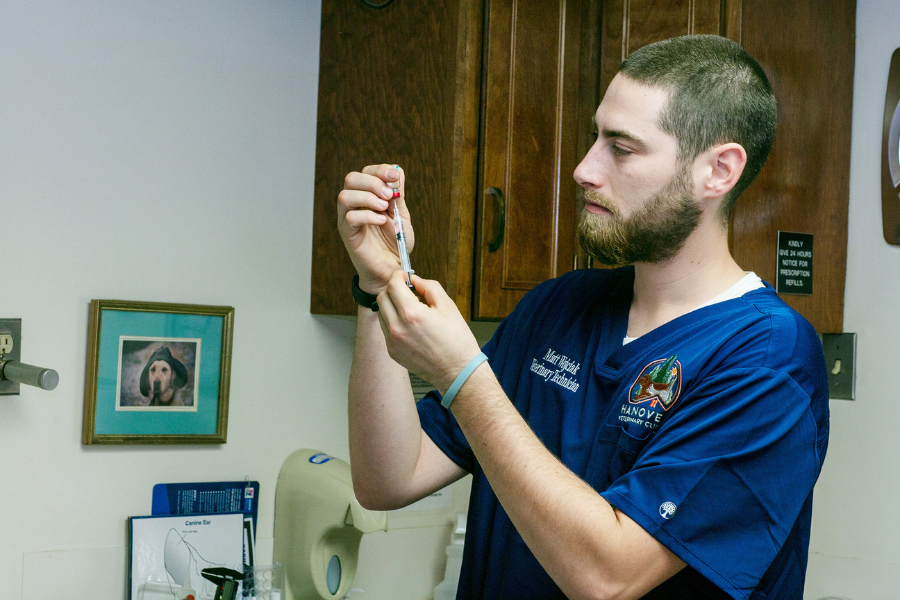Pet Health
VOMITING AND DIARRHEA
Vomiting and/or diarrhea can be very common in dogs. Vomiting in cats is not considered normal, even if you are finding hairballs. Consider consulting with your veterinarian if your cat vomits more frequently than 4 times per month. The causes of vomiting/diarrhea are many and some may be serious requiring immediate medical therapy. Deciding when to bring your pet in for medical attention can be stressful especially when it is after hours or on the weekends. Signs that would indicate you should seek medical attention include:
- Blood in the stool or vomit
- Vomiting more than 2 times in a one day period
- Puppies/kittens or toy breeds
- Extreme lethargy/weakness
- Unable to hold down water
- Protracted vomiting/diarrhea
- History of any medical condition that can make your pet prone to dehydration (kidney disease)
- History of eating objects that can cause a bowel obstruction
- History of eating toxic substances
Always seek medical attention if you are concerned with the health of your pet. Seeking medical attention even for mild signs can help alleviate your pets discomfort more quickly. Some mild forms of vomiting/diarrhea can be resolved without an emergency veterinary visit. If your pet has mild signs consider withholding food for 12 hours but allowing access to water. Then start a bland diet fed in small frequent meals. A bland diet consists of boiled low fat hamburger or boiled boneless, skinless chicken breast mixed with white rice (3:1 rice: meat). If the vomiting returns after starting the diet seek medical attention for your pet. If any diarrhea does not resolve in 2-3 days please call for further advice.
DISEASE PREVENTION
At Hanover Veterinary Clinic we promote disease prevention through vaccines, yearly visits, fecal examinations and monthly heartworm/flea/tick preventative products. A yearly physical exam helps us identify any health issues early and offers an opportunity to update vaccines, discuss concerns and ensure your pet is protected. Checking a stool sample for parasites is important because some parasites can be transmitted to humans and some parasitic infections require medication even if not causing symptoms.
Heartworm disease is caused by a parasite spread through mosquito bites. Adult worms infect the heart and can lead to heart and lung disease. Monthly preventative kills the immature stages preventing establishment of adult infections. We recommend year round administration and yearly heartworm blood test. For more information about heartworm disease please explore the American Heartworm Society website.
Ticks can transmit many diseases that cause harm in dogs. Fortunately, in this area ticks do not transmit diseases to cats but outdoor cats can carry ticks into the house and expose humans. Lyme disease is the most common tick transmitted disease in our area. Signs of Lyme disease can range from severe joint pain, fever, swollen lymph nodes to mild symptoms of low energy, reduced appetite or slight lameness. A monthly preventative will keep ticks from attaching long enough to transmit disease. In general, a tick is attached too long if it is engorged. If you find engorged ticks this indicates the preventative is not working; please contact us for other options. Just like heartworm disease, we recommend yearly blood screening for tick transmitted diseases.
Please ask our staff about the best preventative medications for your cat or dog.
To explore tick facts and images click here.
VACCINE RECOMMENDATIONS
DOGS
We recommend the following vaccines for canine patients
- Canine distemper series (group of infectious viruses)
- Rabies
- Lyme
- Leptospirosis
If your dog has high contact with other dogs (kennel, obedience/puppy classes, groomer, dog park) consider the Bordetella vaccine (kennel cough vaccine).
Puppies require several booster vaccines to provide protection while their immune system develops and maternal antibodies begin to wane. We recommend the canine distemper series at 8, 12, and 16 weeks of age. In the state of New Hampshire and Vermont, every dog must be vaccinated against rabies between 3-4 months of age. Lyme and Leptospirosis vaccines are added depending on the patient and risk for exposure.
CATS
We recommend the following vaccines for feline patients:
- Feline distemper series (group of infectious viruses)
- Rabies 1 year
If your cat spends time outdoors we also recommend the Feline Leukemia vaccine.
Kittens require several booster vaccines to provide protection while their immune system develops and maternal antibodies begin to wane. We recommend the feline distemper series at 8, 12, and 16 weeks of age. In the state of New Hampshire and Vermont, every cat must be rabies vaccinated between 3-4 months of age. Consider the Feline Leukemia Virus (FeLV) vaccine for kittens, even if intending to stay indoors, as young cats are more susceptible to acquiring FeLV.
PET FOOD
With all the food choices on the shelf, selecting the right food for your pet can be an overwhelming and the wealth of information online only complicates the decision. There are many websites with opinions and most are not backed by scientific facts/research. To help answer the question “What food is best for my pet?” please read the article addressing many concerns about pet food form a trusted source. Click here to explore!
Read up on raw diets and debunk pet food myths and facts.
Also, read this article about genetic differences of the domesticated dog and wolves
Trying to understand a food label? Explore these websites: FDA, AAFCO
STRESS FREE APPOINTMENTS
Does your pet become stressed when visiting the veterinary clinic? Common signs pets are stressed included hiding from staff, not taking treats, tail tucked between legs, shaking, panting, vocalizing or having a rigid stance. At HVC we strive to make each exam as stress free as possible with calming environments, treats, gentle handling and sometimes stress reducing medications/sprays. As pet owners you can also help us reduce stress in your pet. If your pet shows signs of stress please make us aware and we can organize a plan to help.
Helpful tips for stress reduction:
- Bringing your pets favorite treats or kibble or toys for the appointment
- Not feeding your pet prior to the appointment can help increase their appetite for treats
- Acclimate your pet to car rides and carriers prior to the appointment
- Use calming items (Thundershirt, pheromone sprays, calming treats/collars/diets)
- Make ” happy visits” where your pet can meet the staff and receive treats and scratches
In pets with extreme anxiety or aggression we recommend a behavioral consult. Please call for further information.
ORAL HYGIENE
Dental disease is one of the most common ailments seen in cats and dogs and is 100% preventable. As your veterinarian I want to ensure we start a good oral hygiene plan. First, if your pet has significant dental disease a dental cleaning may be required before starting an oral hygiene plan. The best home treatment is daily teeth brushing. To start brushing please ask about our brushing handout. The next options include daily chews, treats/food or gels. There are many products available and finding the right one can be overwhelming. The Veterinary Oral Health Council (VOHC) was started to review and approve dental products. You can explore their website for a list of products or you will see a VOHC seal on products in stores. If a dental cleaning is required, please setup an appointment to have your pet examined.
Veterinary Oral Health Council: www.vohc.org
Suggested dental products
- Daily teeth brushing with a child’s toothbrush/finger brush and pet specific toothpaste
- CET rawhide chews (must be supervised to avoid choking)
- Prescription dental diet Hill’s T/D (sold through Hanover Veterinary Clinic)
- Topical gel Healthymouth (can be purchased at: www.healthymouth.com)
- Any VOHC approved product (seal of approval will be on product)
Products to avoid:
- Marrow bones – high risk of fracturing teeth
- Hard plastic chew toys
- Human toothpaste


